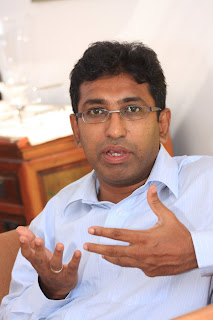There were three potential
common candidates for the opposition before last November: Karu Jayasuriya,
Ranil Wickremesinghe, and Sajith Premadasa. All three were from the UNP. Their
base was from that party. As such it made sense to splinter the government and
this through a key loyalist of the ruling party, the SLFP. Well, it’s been
eight months since Maithripala Sirisena walked out on his former boss, but with
an election around the corner and the man pleading neutrality, both parties are
on their own.
If it’s a fight between these
two then it’s over who has cleaner records. The UNP might win on this count, at
least as far as “clean and honest” is a slogan that guarantees votes and
majorities. But this isn’t just about slogans. It’s about individuals and faces.
In this respect the Greens have that proverbial lion’s share.
They’ve got names: Eran
Wickramaratne, Harsha de Silva, Sujeewa Senasinghe. That’s three among others, moreover. What matters is track record. Yes, Senasinghe didn’t do
himself any favours over the Bond scam or those posters adorning nearly every
corner in Colombo. But the other two stand out. If it all boils down to honest
leadership, rational voters (who measure relative merits and privilege reason over
emotion) will lend unconditional support.
Does this bode well for the
UNP? Not really. “Young” doesn’t really guarantee anything in politics. To be
fair, “old” doesn’t either. But J. R. Jayawardena was almost as old as S. W. R.
D. Bandaranaike (who was his colleague in the UNP once) when he was elected in
1977, 20 years after the latter was shot. Premadasa wasn’t young. Nor was
Wijetunga. Nor were Kumaratunga and Rajapaksa.
We’re not talking about the
presidency here, though. We’re talking about entering parliament: a different
scenario altogether.
 Harsha and Eran have shown
qualities rarely to be met with in politicians here: charisma, humility, and
forbearance. Neither of them has engaged in trashing opponent. Neither of them
has sacred cows, obeisance to party leadership notwithstanding. And more
importantly, neither of them has taken sides over the Ranil vs Sajith fight in
their party.
Harsha and Eran have shown
qualities rarely to be met with in politicians here: charisma, humility, and
forbearance. Neither of them has engaged in trashing opponent. Neither of them
has sacred cows, obeisance to party leadership notwithstanding. And more
importantly, neither of them has taken sides over the Ranil vs Sajith fight in
their party.
In this context what have the
Blues got? They have names. Those are old(er). Vasudeva Nanayakkara has been in politics since 1958 and in parliament since 1970. Roughly the same can be
said of Dinesh Gunawardena and Wimal Weerawansa. Even Ramesh Pathirana, whose
honesty and appeal have never been in doubt (and not only due to his father’s legacy),
seems like “old wine” compared to what the UNP has to offer.
Not that this foretells doom
for that party, of course. It depends on how it can tap into its strengths.
No, this is not (only) about the "Mahinda Resurgence". There’s more. Much more.
For one thing, the last 10
years weren’t merely about deals and commissions. Those who obtained ministerial posts did do something. That “something”, in relation to the “nothing”
which got done in these six months, adds up. Makes sense to build up support
around this.
Counterclaims can be made.
That’s how the UNP will fight back. Allegations of malpractice, cronyism, and
money laundering are up for grabs. Its “new fleece”, furthermore, has
demonstrated values which can persuade any reason-driven voter to get it into
parliament and which are at odds with what the UPFA has as “alternatives”. Sure,
those who vote for it can include the kepuwath
kola crowd, i.e. voters
who’ll even support politicians with dubious pasts as long as they’re with “The
Party”. They’ll figure in at the election too. That’s inevitable however, a
“given” so to speak.
Memories of Rajapaksa’s malpractices can work in
the UNP’s favour. They’re as good as old however. There are other memories.
Recent ones. Like the Bond scandal. These will be dug up too. They will play into
the UPFA. And the JVP.
In the end there are no
saints. No angels. Only relative merits.
Written for: The Nation INSIGHT, August 1 2015
Written for: The Nation INSIGHT, August 1 2015

No comments:
Post a Comment